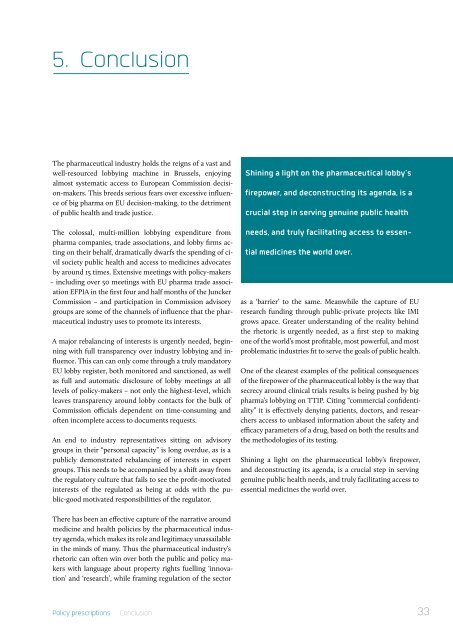Policy prescriptions
20150827_bigpharma_web
20150827_bigpharma_web
- No tags were found...
Create successful ePaper yourself
Turn your PDF publications into a flip-book with our unique Google optimized e-Paper software.
5. Conclusion<br />
The pharmaceutical industry holds the reigns of a vast and<br />
well-resourced lobbying machine in Brussels, enjoying<br />
almost systematic access to European Commission decision-makers.<br />
This breeds serious fears over excessive influence<br />
of big pharma on EU decision-making, to the detriment<br />
of public health and trade justice.<br />
The colossal, multi-million lobbying expenditure from<br />
pharma companies, trade associations, and lobby firms acting<br />
on their behalf, dramatically dwarfs the spending of civil<br />
society public health and access to medicines advocates<br />
by around 15 times. Extensive meetings with policy-makers<br />
– including over 50 meetings with EU pharma trade association<br />
EFPIA in the first four and half months of the Juncker<br />
Commission – and participation in Commission advisory<br />
groups are some of the channels of influence that the pharmaceutical<br />
industry uses to promote its interests.<br />
A major rebalancing of interests is urgently needed, beginning<br />
with full transparency over industry lobbying and influence.<br />
This can can only come through a truly mandatory<br />
EU lobby register, both monitored and sanctioned, as well<br />
as full and automatic disclosure of lobby meetings at all<br />
levels of policy-makers – not only the highest-level, which<br />
leaves transparency around lobby contacts for the bulk of<br />
Commission officials dependent on time-consuming and<br />
often incomplete access to documents requests.<br />
An end to industry representatives sitting on advisory<br />
groups in their “personal capacity” is long overdue, as is a<br />
publicly demonstrated rebalancing of interests in expert<br />
groups. This needs to be accompanied by a shift away from<br />
the regulatory culture that fails to see the profit-motivated<br />
interests of the regulated as being at odds with the public-good<br />
motivated responsibilities of the regulator.<br />
Shining a light on the pharmaceutical lobby’s<br />
firepower, and deconstructing its agenda, is a<br />
crucial step in serving genuine public health<br />
needs, and truly facilitating access to essential<br />
medicines the world over.<br />
as a ‘barrier’ to the same. Meanwhile the capture of EU<br />
research funding through public-private projects like IMI<br />
grows apace. Greater understanding of the reality behind<br />
the rhetoric is urgently needed, as a first step to making<br />
one of the world’s most profitable, most powerful, and most<br />
problematic industries fit to serve the goals of public health.<br />
One of the clearest examples of the political consequences<br />
of the firepower of the pharmaceutical lobby is the way that<br />
secrecy around clinical trials results is being pushed by big<br />
pharma’s lobbying on TTIP. Citing “commercial confidentiality”<br />
it is effectively denying patients, doctors, and researchers<br />
access to unbiased information about the safety and<br />
efficacy parameters of a drug, based on both the results and<br />
the methodologies of its testing.<br />
Shining a light on the pharmaceutical lobby’s firepower,<br />
and deconstructing its agenda, is a crucial step in serving<br />
genuine public health needs, and truly facilitating access to<br />
essential medicines the world over.<br />
There has been an effective capture of the narrative around<br />
medicine and health policies by the pharmaceutical industry<br />
agenda, which makes its role and legitimacy unassailable<br />
in the minds of many. Thus the pharmaceutical industry’s<br />
rhetoric can often win over both the public and policy makers<br />
with language about property rights fuelling ‘innovation’<br />
and ‘research’, while framing regulation of the sector<br />
<strong>Policy</strong> <strong>prescriptions</strong> Conclusion 33


